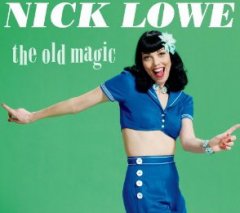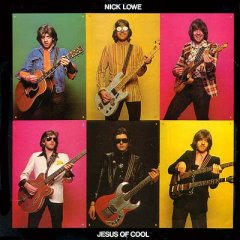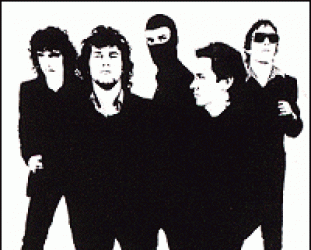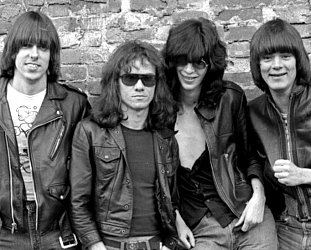Graham Reid | | 8 min read
Nick Lowe: Stoplight Roses

A couple of years ago we passed by this way, a phone call to Nick Lowe at the most unrock'n'roll hour of 9am in the UK (see here). But Lowe again laughs it off -- “I have a six-year old so this is the middle of the day for me” – and concedes that while he was once a notorious party animal (he barely remembers playing in Australia in the early Eighties) says “I don't miss keeping the rock'n'roll hours. I spent many years doing that and thoroughly enjoyed it, but as you get older your tastes change and with my little boy I'm rather constrained by his operation”.
At 62, with broom-brush white hair and currently a promo photo which makes him look like an end-of-the-pier British comedian, Nick Lowe – who uses words like “highfalutin” – wouldn't seem to be one to “get down with the kids”, as he jokingly puts it.
But this fine English singer-songwriter and producer – whose career began in pre-punk pub rock and country-rock, was a producer on Elvis Costello's early albums and for Dr Feelgood among many others, wrote the minor classic What's So Funny 'Bout Peace, Love and Understanding at the height of punk fury (covered by Costello) and enjoyed a cult following and critical acclaim for his album Jesus of Cool in 1978 – has had a second life since his very considered series of albums since 94's The Impossible Bird.
He might write adult songs steeped in classic country and Sam Cooke-styled balladry about bitterness, marriage breakups, being controlling in relationships and loneliness, but lately he's been putting himself in front of a very different audience at the invitation of Wilco who had him as an opening act.
“I was quite astonished when asked,” he admits, “but I thought it was a bold and interesting move on their part. They could have had any cool young gunslinger, but me? I didn't know how I would be received.
“I was anxious to put myself in front of their audience, an audience I am interested in ingratiating myself to because they are in their 30s and 40s and are musically literate. Although my audience is changing, I'm starting to see much younger people and a lot more women, and not so many old blokes with grey pony tails.
“They're still welcome,” he laughs. “I don't want to drive anyone away. However with Wilco I thought I might go on and off to the sound of my own footsteps, but the reception was fantastic.”
Delighted by the reception he enjoyed, Lowe says he kept the rockabilly out (“that seems to frighten the youngsters”), omitted the really dark stuff like Failed Christian and Faithless Lover (from his exceptional Dig My Mood album of 98) but added Costello's Alison (“a lovely song, who wouldn't like that?”) and his own minor hit Cruel to Be Kind.
 Of course he plays
material from his new album The Old Magic. Even the melancholy I Read
A Lot for a generation which perhaps doesn't read at all?
Of course he plays
material from his new album The Old Magic. Even the melancholy I Read
A Lot for a generation which perhaps doesn't read at all?
“That is rather cynical I would suggest,” he laughs. “Actually I do I Read A Lot on some nights and they rather like it. And House for Sale, and some of them haven't ever bought a house but they seem to get it. They are not children or teenyboppers. I'm not opening for Justin Bieber . . . yet.”
And of House For Sale? Is Lowe aware of the old standard Cottage for Sale to which it bear some similarity in sentiment?
“No, I don't know that but . . . wait a minute a bell is ringing, Peggy Lee? “I remember the sentiment, I can understand immediately where it is coming from, you and I know what it means to pass up our possessions.
“Hmmm, so absolutely at a subconscious level that is where it came from. I think you are absolutely right. I must dig that out, it might be frighteningly close. It doesn't seem like it's that original idea anyway and luckily the copyright on ideas is blurred,” he chuckles.
Anyone who saw the good humoured Lowe when he played in Auckland with Ry Cooder two years ago will delight in his return for a show with his own band (see date below) where he airs the quietly sophisticated and sometimes gently ironic recent songs and peppers in a few oldies.
Lowe's career is long, complex and in its early decades punctuated by his irreverent humour. On Jesus of Cool (retitled Pure Pop For Now People for America) he sang about silent movie star Marie Provost being eaten by her dogs (an exaggeration), released I Love My Label when he clearly didn't (which Wilco covered and invited him on for) and after David Bowie released the Low album, Lowe released the EP Bowi.
 But he concedes
that irreverence, although enjoyed by certain fans, became tiring so
he consciously tried to eliminate that tendency. He now takes more
time over his songs and lives with them over a longer period before
recording: “I think it's finished when it doesn't sound like I've
written it, like I've learned a cover”.
But he concedes
that irreverence, although enjoyed by certain fans, became tiring so
he consciously tried to eliminate that tendency. He now takes more
time over his songs and lives with them over a longer period before
recording: “I think it's finished when it doesn't sound like I've
written it, like I've learned a cover”.
His material today is crafted and classy, and on songs like Stoplight Roses on the new album he reaches into a deep well of understanding and creates a striking image along the way.
“Like many people, you are stuck in traffic at the lights and someone has come up and shoved this sad bunch of flowers through my car window. I was struck one day when I was shooing this person away what it means if you actually bought them.
“One of the traditional reasons for buying flowers for a person is to apologise and I thought if you actually gave someone a bunch of these flowers it would make things about 20 times worse.
“I would be actually livid if somebody gave me these things to apologise for some gaff – and so I thought it was a good idea for a song and started thinking about this person who had got away with behaving badly and all he had to do was this. But this time he's overstepped the make and there is nothing he can do.
“My main problem was thinking what to call it because there's no name for them and 'traffic-light roses' doesn't exactly roll off the tongue. Or you can buy them in garages and in the UK they call them forecourts, 'Forecourt' is rather sweet old fashioned word but that doesn't really sing that well and American's call those things stoplights so . . .”
And by doing so created a memorable phrase?
“Then my work here is done,” he laughs.
At his age Lowe would be allowed to be a little cynical, yet songs like Sensitive Man ride a fine line between cynicism, skepticism and sentimentality. It is a hard balancing act and must entail a lot of thinking and rewriting.
“I do and I try to keep moving. The odd thing about writing songs . . . first, I never thought I'd be doing it at this age . . . but my tastes haven't changed that much and I still like the same stuff. Even though my bucket of influences have got larger it is all the same kind of stuff.
“When I get an idea for a song -- and I have to wait to be inspired, it seems I'm prolific but I'm actually not -- but when I get an idea I work away at it and I think it's finished when it doesn't sound like I've written it, like I've learned a cover as if it was playing on the radio on a cool station in an apartment next to mine.
“It's like I can only just hear it through the wall and I stop what I am doing and put my ear to the wall and learn a little more of the verse. Finally the day comes when I learn the last bit and I can stand back from it and it will feel as if i've had nothing to do with it.
“It's the same in reverse with a cover, I worry away at it until I think I've written it.
“The older I get, the more I want to not interfere with the pure idea of the song. It sounds very poncey I know, but so many people ask me about this that I've been forced to come up with this high falutin idea.
“Back when I first got noticed in the Seventies it was for being rather irreverent and popping bubbles, and I was a bit cheeky. A certain kind of fan liked that, but I got very tired of that very quickly so I tried to eliminate that smart arse thing from what I was doing.
“I have a tendency to do that so I am always watching out for that, but at the same time as you work on your craft you keep one eye on your fan base and you don't throw out what everyone likes about what you do.
“So it's a fine line between that and what you yourself like. I find if I catch myself in the process -- and I've read articles by songwriters saying this, it is common to people who write songs – you try and detach yourself from it so you don't see any of your little tricks or conceits that you might naturally put in.”
 The results are
more rewarding for him and his more mature audience, yet when Jesus
of Cool and its follow-up Labour of Lust were given expanded CD
reissue recently he confronted his old self again.
The results are
more rewarding for him and his more mature audience, yet when Jesus
of Cool and its follow-up Labour of Lust were given expanded CD
reissue recently he confronted his old self again.
“I could recognise the person who was there but was listening to Jesus of Cool through the cracks in my fingers really. I was hearing good ideas but I could also hear padding and knew I could have found a more elegant sentence to get the meaning across. Or when I was sticking in a line of nonsense because I was too lazy then.
“But to many people that's what gave it charm. For me it was like being shown a Super 8 movie of yourself as a teenager drunk at a party. It is the same person and by no means am I contemptuous of that person, I think I did some pretty good stuff back then.”
These days Lowe is on a very different career high. His recent albums of his “new period from The Impossible Bird onwards have gone into the black”, he writes from where he is at in his life (in 2007 he released the excellent and appropriately titled At My Age) and his most recent The Old Magic has garnered critical praise and even more significant sales. People who have never bought a previous album have come in for this one, he says.
“I think it's a pretty good record and doesn't sound too frightening. The sound of my records can put the general public off. I think they sound great but that homemade quality some people find so refreshing and delightful makes the general public very nervous and they don't care for it.
“But this one has a more sophisticated sound perhaps, I don't know.”
He admits that he has been promoting The Old Magic “and some of the posher magazines have been interested in talking to me”.
Because perhaps he is like a senior British statesman in pop? The survivor who matured with elegance and wit?
“I think so,” he laughs. “And there is a pretty good story there. There's a fine line between the wonderful old trooper who has never quit and stayed true to his craft to the clapped out has-been who should just knock it on the head. They see me as a good story.
“I don't feel like I'm an anachronism because I seem to be attracting a younger audience. I always thought if I could do something natural to me and get it hip enough that youngsters who have got ears to hear would be attracted to it. Then I wouldn't have to do something embarrassing to get down with the kids and ingratiate myself.
“I didn't want to be condemned to be always doing what I did when I had my time in the sun.”
Nick Lowe and his band play a one-off fully seated show at Auckland's Powerstation, March 31, 2012





post a comment